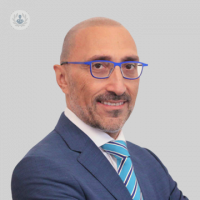Hair follicle banking: What is it, and is it for me?
Escrito por:Did you know that harvesting and banking hair follicles when they are strong, so they can be preserved for future use, is now possible?
Here to provide an in-depth guide to this innovative process is one of the UK's leading hair loss experts and one of the world’s top hair transplant surgeons, Dr Bessam Farjo. The co-founder of the award-winning Farjo Hair Institute also discusses how the clinic is at the forefront of hair follicle banking and giving patients the opportunity to start preserving, right now.

What are the latest solutions are available for hair loss?
Finding new solutions and planning for the future is extremely important for those concerned about hair loss.
Thankfully, Farjo Hair Institute and HairClone scientists are in the process of creating a ground-breaking rejuvenation, and eventually potential regeneration, treatment. It is hoped to allow you to ‘stop the clock’ on thinning hairlines.
While the actual treatment is still under clinical development, cryopreservation is now available for those interested and want to start banking their hair follicles. Cryopreservation is a process that preserves the hair follicles by cooling follicles to very low temperature.
The banking itself is not a hair loss treatment but it allows you to save your follicles, the precious raw material needed, for carrying out the treatment when it launches.
Why should my hair follicles be banked?
Hair-making cells deteriorate in quality with age, just like other cells in the body. Banking hair follicles at the earliest opportunity can pause the ageing process for cells, which means you have better quality cells for any future treatment.
Those patients that bank their follicles will have undergone the first stage of the process. They will be the first patients to be offered the option of the new cell treatment once it becomes available.
The cryopreserved follicles will remain your property so if you feel there’s a therapy that’s more suitable in the meantime – or at any time – they will be made available for your use.
What’s involved in the banking of hair follicles?
Over one hundred hair follicles will be extracted from the back of your head by our surgeons, while you are under local anaesthetic. This process can be undertaken as part of a hair transplant or during a stand-alone simple surgical procedure which takes under an hour to complete.
A solution that keeps cells alive is used for the follicles, which are then transferred to the HairClone laboratory at the Farjo Hair Institute.
Here, using a state-of-the-art controlled-rate tissue freezer, the follicles will be cryopreserved and then transported in a specially designed, refrigerated box and stored at -180°C in a licensed cell bank. There’s evidence that cells can be kept alive for many years at these temperatures.
What’s next in the hair harvesting process?
Patients that have banked their hair follicles will be the first to schedule their procedure once the new hair rejuvenation treatment is made available. This is likely to happen in the next one to two years.
A small number of banked follicles will be carefully thawed, multiplied (i.e., cloned) and implanted into the scalp via injection.
Who is suitable for this treatment?
Men and women with thinning (or miniaturised) hairs, rather than those who have clear baldness, will be able to have this treatment initially. Its aim is to rebuild and rejuvenate recently miniaturised hair follicles and re-create thicker hair shafts.
When it’s necessary to rejuvenate additional miniaturising hairs, this treatment can be repeated. This allows for a consistent appearance so that hair loss is never noticeable.
Farjo Hair Institute and HairClone also hope to provide treatment for patients with extensive hair loss, where the hair follicles have miniaturised too much to be rejuvenated, in the future. It will enable the creation of brand-new hairs but this treatment will unfortunately take considerably longer to develop.
If you’re worried about hair loss in the coming years and want to ensure you’ve got an effective plan already set in place, arrange a consultation with Dr Bessam Farjo.



